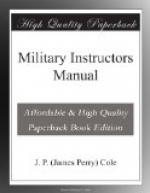Helpful References to the Articles of War.
(Extracted from M.C.M. and Guide to the Articles of War—Waumbaugh’s Lectures.)
MILITARY LAW is the body of rules that governs members of the army. Military Law is based upon the Articles of War approved by Congress, August 27, 1916, effective March 1, 1917. This body of rules defines:
(1) Punishable
offenses of members of the army.
(2) The Method
of determining guilt.
(3) Punishment.
The present Articles of War are revisions of those from the Revolution.
ARTICLE 1.
DEFINITIONS:
(1) The word “officer”
shall be construed to refer to a
commissioned
officer (and no one else).
(2) The word “soldier”
to include non-commissioned officer or any
other enlisted
man.
ARTICLE 2.
PERSONS SUBJECT TO MILITARY LAW:
(1) All officers and soldiers of
the Regular Army.
(2) All volunteers in the service
of the U.S.
(3) All other persons lawfully called,
drafted or ordered into such
service.
(4) West Point cadets.
(5) Officers and soldiers of the
Marine Corps when detached for
service
with the army, by order of the President.
(6) All retainers to the camp, or
accompanying or serving with the
army in
time of war, both within and without territorial
jurisdiction
of U.S.
(7) All persons under sentence by
court-martial.
ARTICLES 3-18.
COURTS MARTIAL CLASSIFIED:
(A) General Courts Martial.
Appointed by
(1) President,
(2) Commanding officer of department or territorial
division.
(3) Commanding officer of separate army division
brigade.
(4) Commanding officer of district or force
empowered by
President.
Jurisdiction.
Over all persons subject to Military Law
as regards all
offenses punishable by Military Law.
Sentence.
Everything.
(B) Special Courts Martials (3 to 5 officers inclusive).
Appointed by
(1) Commanding officer of district, garrison,
fort or camp.
(2) Commanding officer of brigade, detached
battalion.
Jurisdiction.
Over any person subject to military law (except
an officer),
and for any crime not capital. (Only
soldiers excluding
those having certificate of eligibility
for promotion.)
Sentence.
(1) No power to adjudge dishonorable discharge.
(2) No confinement in excess of six (6) months.
(3) No forfeiture of pay in excess of six
(6) months.
(C) Summary Courts Martial (one (1) officer).
Appointed by
(1) Commanding officer of garrison, fort,
camp, etc.
(2) Commanding officer of regiment, detached
battalion, etc.
(N.B.) When but one (1) officer is present




